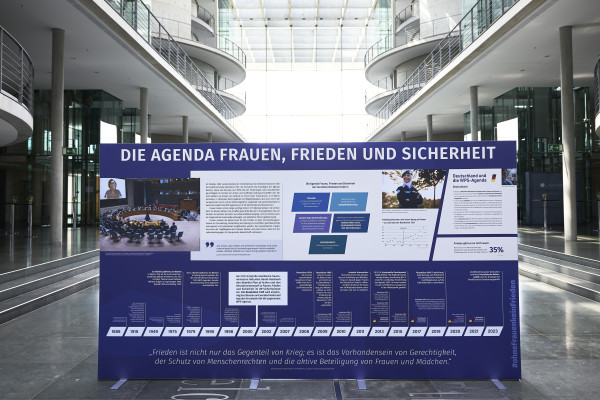The WPS agenda: a guiding principle for the ZIF
 © ZIF
© ZIF
Since its inception, the Women, Peace, and Security Agenda has been our motivation, framework for action, and guiding principle. By sending civilian experts on peace missions and to multilateral organizations, and through targeted knowledge transfer and political consulting, we can actively contribute to its implementation.
For years, we have been committed to maintaining the necessary expertise in our personnel pool so that we can second staff to relevant positions. Our seconded staff work as gender equality experts, human security or regional gender mainstreaming advisors, or investigate sexual violence in conflicts for organizations as diverse as the OSCE, NATO, the Council of Europe, the EEAS, EU missions, and UN peacekeeping operations.
We are responsible for the conceptual “adjustments” at our headquarters in Berlin. In recent years and months, we have repeatedly accompanied and contributed to discussions on the WPS agenda and created spaces for reflection.
Our training portfolio includes a course on “Women, Peace & Security – Gender-Sensitive Approaches in Peace Missions,” which we organize in collaboration with the police. As we want to integrate the WPS agenda into a fundamental understanding of gender equality, we are currently revising our Comprehensive Core Course – the basic preparatory course for missions. The individual thematic modules on WPS or intersectionality will remain in place, but will be embedded in a comprehensive gender mainstreaming approach in the future.
We are continuing the exchange on this topic – most recently in the practical workshop Why Peace Needs Women – WPS rethought in the program of the 2025 Ambassador Conference. Our managing director, Dr. Astrid Irrgang, was able to contribute valuable and unique deployment perspectives from the seconded staff there. In the summer, we once again designed a module on WPS from a deployment perspective for the German Foreign Office's international diplomat training program.
To move forward, reliable partnerships are also needed. That is why we are in regular contact with organizations and institutions that are developing and implementing the WPS agenda. In September, we welcomed a delegation from UN Women Afghanistan to the ZIF. Their impressive reports make it clear that the participation of women in conflict areas and peace processes is extremely important. Our network includes international organizations, international NGOs, and think tanks. Over a period of two years, we were even able to establish a WPS project with the aim of bringing together and networking civil society actors.
Women, peace, and security was also the theme of Peacekeeping Day 2023, jointly organized by ZIF and the German Foreign Office in the Bundestag. We designed the 12-part exhibition #ohneFrauenkeinFrieden (no peace without women), which presented the agenda with many practical examples and figures and gave female personnel a voice. To mark the 25th anniversary of UN Resolution 1325, we presented the exhibition again at the French Embassy in September.
In recent years, we have been able to inspire more and more women to take on jobs in crisis management. We attend women's career fairs, and female secondees have their say in discussion panels and social media posts. We support women in selection and nomination processes, thereby contributing to an increase in the number of female specialists and managers on assignments. To this end, we have our in-house “Women in Leadership” working group, which also organizes our “ZIF Women's Circle” on various topics. This format offers a safe space for exchange and networking, where experiences, challenges, and solutions can be shared to empower women.
Last but not least, our Women, Peace, Security & Youth, Peace, Security working group is a real driving force within our organization. Colleagues from across teams are committed to implementing agendas, stimulating ideas, picking up on impulses, and keeping the ZIF articulate and innovative.